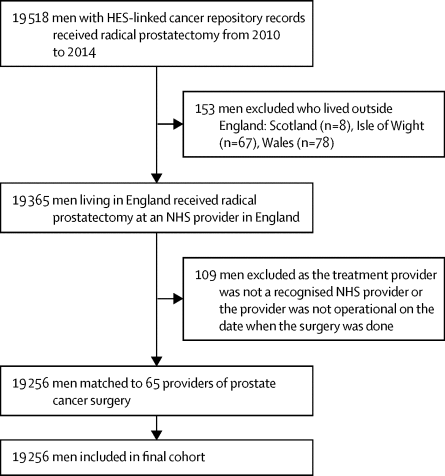The Lancet Oncology ( IF 41.6 ) Pub Date : 2017-10-03 , DOI: 10.1016/s1470-2045(17)30572-7 Ajay Aggarwal , Daniel Lewis , Malcolm Mason , Arnie Purushotham , Richard Sullivan , Jan van der Meulen

|
Background
There is a scarcity of evidence about the role of patient choice and hospital competition policies on surgical cancer services. Previous evidence has shown that patients are prepared to bypass their nearest cancer centre to receive surgery at more distant centres that better meet their needs. In this national, population-based study we investigated the effect of patient mobility and hospital competition on service configuration and technology adoption in the National Health Service (NHS) in England, using prostate cancer surgery as a model.
Methods
We mapped all patients in England who underwent radical prostatectomy between Jan 1, 2010, and Dec 31, 2014, according to place of residence and treatment location. For each radical prostatectomy centre we analysed the effect of hospital competition (measured by use of a spatial competition index [SCI], with a score of 0 indicating weakest competition and 1 indicating strongest competition) and the effect of being an established robotic radical prostatectomy centre at the start of 2010 on net gains or losses of patients (difference between number of patients treated in a centre and number expected based on their residence), and the likelihood of closing their radical prostatectomy service.
Findings
Between Jan 1, 2010, and Dec 31, 2014, 19 256 patients underwent radical prostatectomy at an NHS provider in England. Of the 65 radical prostatectomy centres open at the start of the study period, 23 (35%) had a statistically significant net gain of patients during 2010–14. Ten (40%) of these 23 were established robotic centres. 37 (57%) of the 65 centres had a significant net loss of patients, of which two (5%) were established robotic centres and ten (27%) closed their radical prostatectomy service during the study period. Radical prostatectomy centres that closed were more likely to be located in areas with stronger competition (highest SCI quartile [0·87–0·92]; p=0·0081) than in areas with weaker competition. No robotic surgery centre closed irrespective of the size of net losses of patients. The number of centres performing robotic surgery increased from 12 (18%) of the 65 centres at the beginning of 2010 to 39 (71%) of 55 centres open at the end of 2014.
Interpretation
Competitive factors, in addition to policies advocating centralisation and the requirement to do minimum numbers of surgical procedures, have contributed to large-scale investment in equipment for robotic surgery without evidence of superior outcomes and contributed to the closure of cancer surgery units. If quality performance and outcome indicators are not available to guide patient choice, these policies could threaten health services' ability to deliver equitable and affordable cancer care.
Funding
National Institute for Health Research.
中文翻译:

患者选择和医院竞争对癌症手术中服务配置和技术采用的影响:一项基于人群的全国性研究
背景
缺乏关于患者选择和医院竞争政策在手术癌症服务中的作用的证据。先前的证据表明,患者准备绕过他们最近的癌症中心去更远的中心接受手术,从而更好地满足他们的需求。在这项基于人群的全国性研究中,我们以前列腺癌手术为模型,研究了英国国家卫生局(NHS)中患者流动性和医院竞争对服务配置和技术采用的影响。
方法
我们根据居住地和治疗地点,绘制了2010年1月1日至2014年12月31日期间在英格兰接受根治性前列腺切除术的所有患者的地图。对于每个前列腺癌根治术中心,我们分析了医院竞争的效果(通过使用空间竞争指数[SCI]来衡量,得分为0表示最弱的竞争,得分为1表示最强的竞争)以及成为已建立的机器人根治性前列腺切除术中心的效果在2010年初根据患者的净利得或损失(在中心接受治疗的患者数量与根据居住地而定的预期患者数量之间的差异),以及关闭其前列腺癌根治术的可能性。
发现
在2010年1月1日至2014年12月31日期间,有19 256名患者在英国的NHS诊所接受了前列腺癌根治术。在研究期开始时开设的65个前列腺癌根治术中心中,有23个(35%)在2010-14年度的患者中有统计学意义的净增长。在这23个中,有10个(40%)是已建立的机器人中心。在研究期间,65个中心中有37个(57%)的患者净损失显着,其中两个(5%)是建立的机器人中心,十个(27%)关闭了根治性前列腺切除术。与竞争较弱的地区相比,关闭的根治性前列腺切除术中心更有可能位于竞争更激烈的地区(最高SCI四分位数[0·87-0.92]; p = 0·0081)。不论患者净损失的规模如何,都没有关闭机器人手术中心。
解释
除了主张集中化的政策和要求进行最少数量的外科手术的要求以外,竞争因素还促成对机器人手术设备的大规模投资,而又没有明显效果的证据,并导致了癌症外科部门的关闭。如果没有质量表现和结果指标可指导患者选择,则这些政策可能会威胁卫生服务提供公平和负担得起的癌症治疗的能力。
资金
国立卫生研究院。











































 京公网安备 11010802027423号
京公网安备 11010802027423号